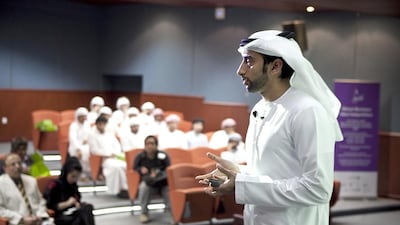In recent years, the quest to decipher the entrepreneurial "code" or DNA has gained significant traction worldwide; it has also ignited a global discussion riddled with opposing views and theories. This, of course, comes as no surprise. The overriding question of whether entrepreneurs are born or bred sparks a hefty debate, and one which tackles a long-standing concern: can an entrepreneurial spirit actually be cultivated, or is it purely innate? In general, arguments supporting the former outweigh the latter by far.
The truth is, understanding the anatomy of an entrepreneur is a tricky landscape to navigate – and one that comprises a slew of complex processes and dynamics. Still, in the past decade, unlocking this phenomenon has emerged as a central issue – of national importance – here in the UAE. The Government has placed entrepreneurship high on the national agenda, recognising its role as a catalyst for a strong, balanced and diverse economy.
Despite the existence of numerous UAE-based entrepreneurial initiatives, we still do not have a large number of young business pioneers. In fact, according to a survey conducted by the Global Entrepreneurship Monitor, in 2011, the UAE had the second lowest rate of established entrepreneurs, at just 2.7 per cent. That same year, fewer than seven adults per 100 intended to start a new business.
Given these figures, it is absolutely imperative that, together, we question how to better nurture the next start-up generation. First and foremost, we must identify the character traits that punctuate the personality of a successful entrepreneur and ensure that those are instilled among UAE youth during their most formative years.
There is no doubt that the entrepreneurship mindset is marked by distinctive characteristics and patterns of thinking. Most entrepreneurs possess a unique type of temperament – one guided by a reluctance to play by the rules. This entrepreneurial outlook is the culmination of a series of social, behavioural and intrinsic factors, all of which straddle the line between nature and nurture.
What remains clear, however, is that an entrepreneurial pursuit doesn’t necessarily have to be ingrained in a person’s genetic code; it can also be stimulated at a young age, and successfully seeped into a child’s consciousness. And so, instead of encouraging young graduates to navigate the entrepreneurial path post-academia, we must create initiatives to boost pioneering thinking pre-graduation and during students’ developmental years. This inevitably means promoting a more proactive approach to entrepreneurship both from an education and home life standpoint.
It is time to ask ourselves: what can we do to ensure that the seeds of entrepreneurship are planted into the psyches of Emirati children early on?
It has long been stipulated that the ability to build creative innovators with strong leadership skills is what forms the crux of a successful education system. In the UAE, our education programmes are steeped in the tradition of academic development; however, our curricula don’t posit or even present a direct connection between entrepreneurship and economic self-sufficiency. This is precisely why entrepreneurship education – at pre-university levels – is so vital: it would allow young students to sharpen their creative prowess, learn to operate at a gut level, enhance their leadership abilities and even shape their social psychological development.
Simply put, it is about building an academic programme that fosters an entrepreneurial spirit so that, once these young Emiratis enter the professional world, they are not left staring into the abyss of instability. Indeed, the Global Entrepreneurship Monitor Report revealed in 2011 that 51 per cent of adults who did not start a new business in the UAE were held back by a fear of failure.
An efficient education can push people to be intellectually independent and better able to embark on an entrepreneurial career trajectory. In short, the entrepreneurial path is fraught with challenges; and so exposing young Emiratis to entrepreneurship early on is key to bridging the chasm between a groundbreaking vision and real-world fears.
Family life is also part and parcel of an individual’s entrepreneurial experience. Parents can help craft their children’s entrepreneurial capacity by imbuing them with a deep understanding of this particular world and imparting a self-made ethic at an early age. This entails forging a high-performing culture of innovation within the household – one that advocates individualism and self-belief, spurs self-efficacy, praises entrepreneurs as role models, urges independent reasoning, sanctions adventure and incites risk-taking.
This process can be facilitated with the creation of family-oriented science fairs, sessions and discussion panels geared towards youth-driven entrepreneurial activities and actions. Raising awareness of government-led initiatives can also aid aspiring entrepreneurs in finding the tools and resources to bring their idea to fruition. This is essential as the Global Entrepreneurship Monitor Report found that, in the UAE, more than 65 per cent of individuals looking to launch a business relied solely on family and friends as an advisory network. That is simply not sufficient.
To conclude, qualifying our budding UAE entrepreneurs early on is critical if we seek to truly tap into their full potential. To achieve this, there needs to be a seismic cultural shift in the Emirates – one that brings about the changes needed to harness the power of entrepreneurs and secure our nation’s prosperous future.
Ahmad bin Byat is the chairman of du, chief executive of Dubai Holding, director general of the Dubai Technology and Media Free Zone Authority, and a member of the board of trustees of the Mohammed bin Rashid School of Government

